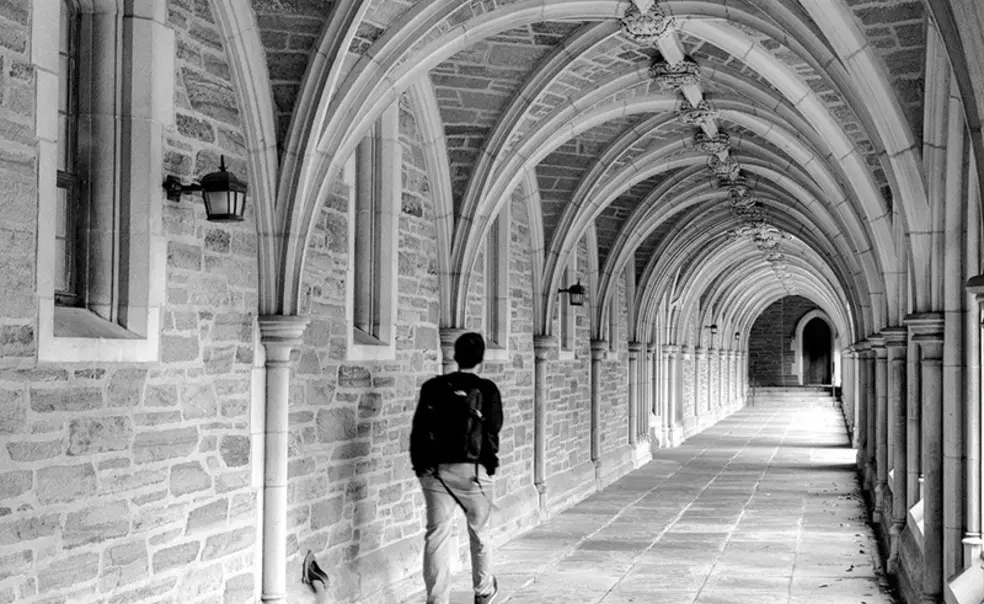Guest Essay: Reimagining Mental Health at Princeton
A call to fight stigmas and add resources for students
Editor’s note: If you or someone you know may have suicidal thoughts, you can call the 988 Suicide and Crisis Lifeline or chat online at 988lifeline.org.

As I scanned the pages of the bright orange brochure I had received in the mail, one bold quote captured my attention: “Princeton is the best damn place of all.”
The 18-year-old me soaked in those words, knowing I was about to enter Princeton without any semblance of what to expect — a feeling that is likely familiar to the incoming Class of 2027. A few of my well-meaning friends and family members tried to offer me advice on how to navigate the Orange Bubble before I flew to Newark in 2019, but one piece of advice was never explicitly shared: Stay alive.
Since starting college, I have lost at least one fellow student for each year I spent in school: Jazz Chang ’23, Kevin Chang ’23, Justin Lim ’25, Misrach Ewunetie ’24. They portray a troubling picture of the modern college experience, where my final exams were often followed by reading about another loss days after the semester’s grades were returned. On top of this, one year into college, COVID-19 fundamentally challenged what it meant to have normal academic and social lives. Suddenly, pandemic-era Princeton took hold, with late assignments, an utter lack of motivation, and sleeping through class defining entire semesters for me. It was the first time I had to personally confront how mental illness stirred within me, while recognizing that by the spring of 2021, a record number of my peers were facing the same battles, according to Counseling and Psychological Services statistics cited by The Daily Princetonian.
Recent years have facilitated debates about Princeton’s mental health policies, including President Christopher Eisgruber ’83’s statement to The Daily Princetonian that academically rigorous environments “are fully consistent with and helpful to mental health.” Mental illness is already highly stigmatized, but in conjunction with a high-stress environment and a counselor-to-student ratio of 1 to 300, we have witnessed a vicious cycle of students needing help yet not being or feeling able to access it.
As alumni and current students know, it has long been a running joke that Princeton students are excessively busy. But, in light of the pandemic, I saw how an already stressful culture was pushed to its breaking point. Students made numerous public calls for the University to lower academic expectations due to spiking anxiety or even student suicides. Even then, the response we received was consistently depersonalized, wishing us students “well” and circulating the same resources following each tragedy. Many studies have found that students at high-achieving institutions are most susceptible to mental health crises, and the lived reality of myself and my classmates brought these facts into vivid focus.
Last May, when I graduated, my social media feeds were flooded with my classmates’ “love letters” to Princeton. They described how, despite its academic hardships, Princeton blessed us with opportunities that once seemed unattainable. They’re right. Princeton transported me out of my North Dakota hometown and placed me directly in classes that gave me arguably the best education I could have received. But I’d be remiss to not talk about the imperfections of my home away from home. I write these thoughts with the intention of bettering Princeton. No university is perfect, but that should never deter pushes toward progress.
What might this pragmatically look like? First, focus on students’ lived experiences and the policies they have been fighting for. This includes increasing mental health resources, providing more readily available counseling (without week-long wait times), and enhancing diversity among our counselors. To be proactive, we must also continue to push the University to destigmatize the notion that their focus on academics is paramount. Perceived stigma is one of the greatest driving factors behind why college students do not receive help, and academic rigor should never come before one’s life.
This month, as the newest Princetonians arrive and wonder what the next four years have in store for them, I have no doubt that many have the same anxieties that I had four years ago. So, here’s to “the best damn place of all” and having the alacrity to question how we can have future classes not only survive but thrive.










4 Responses
Stewart A. Levin ’75
2 Years AgoHave We Lost the Wonder of Learning at Princeton?
While I wholeheartedly agree with Preeti Chemiti ’23 that mental health resources are a necessity (On the Campus, September issue), I fear that a good portion of current students’ stress is related to the pressure of grades. One of my most striking moments at Princeton was about two weeks after starting in 1971 when I found that for just about everyone I knew, the whole high school push to earn the highest possible grades had sloughed off and been replaced by the wonder of learning and doing new and exciting things. We couldn’t wait to share this excitement. And this was an era in which only about 30% of grades were A’s. I fervently hope this defining Princeton experience has not been lost forever.
Thomas H. Pyle ’76
2 Years AgoLocal Mental Health Resources: NAMI Mercer Can Help
Many thanks to Preeti Chemiti ’23 for her important opinion piece (On the Campus, September issue). As Princeton students manage their campus careers, especially with their peer expectations of “effortless perfection” amid Princeton’s high-status, high-achievement, high-stress environment, they surely will find that more mental health issues will undoubtedly arise. This is even more true now that Princeton was just ranked by The Wall Street Journal as the best college in the nation, which will create even more of its own pressures of expectations.
All this can add to the weight of other mental health issues that all people everywhere carry from their backgrounds, family histories, and other situational experiences, including the effects of serious and persistent mental illness like schizophrenia, clinical depression, and severe anxiety. In addition to campus-based resources such as at the Counseling Center, near campus is NAMI Mercer, the National Alliance of Mental Illness Mercer County chapter. Part of a stellar national network, NAMI Mercer supports, educates, and advocates for all loved ones with any form of mental issue. We provide resources and connections. We offer support groups. We help individual loved ones and their family members address seemingly intractable problems of mental illness. NAMI Mercer is an ever-ready resource of all possible help and support for any of the University community at any time. Learn more at www.namimercer.org. We are here to help.
Editor’s note: The writer is president of NAMI Mercer.
Jackie Reyneke ’17
2 Years AgoThank You, Preeti!
Thank you so much for sharing your perspective and call to action, Preeti! I couldn’t agree more with everything you expressed. Sending my best to you!
Harold A. Maio
2 Years AgoWe Are of Different Minds
“Mental illness is already highly stigmatized.”
By some, even a majority, but by far not by us all. Societies have a very long tradition of directing that prejudice, and an equally long awareness of the harm induced in so doing. Still, we cooperate, many of us automatically.
Perceived stigma is one of the greatest driving factors behind why college students do not receive help. To be perceived it has to be directed. We are no strangers to seeing it directed. Nor in ourselves directing it.